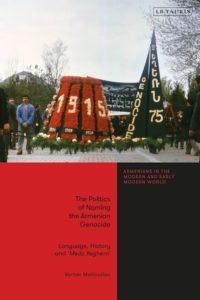 I.B. Tauris, an imprint of Bloomsbury Publishing, has just released The Politics of Naming the Armenian Genocide: Language, History and ‘Medz Yeghern’ by Dr. Vartan Matiossian, the first book in its new series Armenians in the Modern and Early Modern World. This book, the result of 10 years of painstaking research, explores the genealogy of the concept of ‘Medz Yeghern’ (Great Crime), the widely used Armenian term for the annihilation of the Armenians in the Ottoman Empire between the years 1915 to 1923. Ascribing the right definition to the crime, widely accepted by historians as one of the classical cases of genocide in the 20th century, has been a source of contention and controversy in international politics. Matiossian has tackled a subject both omitted and misinterpreted in the historiography, taking a combined historical, linguistic, literary and political perspective. He has drawn upon an impressive collection of Armenian literary and periodical sources, as well as other European languages in order to trace the development of the concepts pertaining to mass killing and genocide of Armenians from the ancient to the modern periods. Beginning with an analysis of the term yeghern itself, he shows how its use evolved along with the emergence of the term genocide in 1944 and the Armenian struggle for international recognition of the crime in the face of Turkish protest. The book is an insightful exploration of the politics of naming a catastrophic historical event, with a careful analysis of the use and abuse of Medz Yeghern by the Vatican, Turkey and the United States over the past two decades and its repercussions in the Armenian realm.
I.B. Tauris, an imprint of Bloomsbury Publishing, has just released The Politics of Naming the Armenian Genocide: Language, History and ‘Medz Yeghern’ by Dr. Vartan Matiossian, the first book in its new series Armenians in the Modern and Early Modern World. This book, the result of 10 years of painstaking research, explores the genealogy of the concept of ‘Medz Yeghern’ (Great Crime), the widely used Armenian term for the annihilation of the Armenians in the Ottoman Empire between the years 1915 to 1923. Ascribing the right definition to the crime, widely accepted by historians as one of the classical cases of genocide in the 20th century, has been a source of contention and controversy in international politics. Matiossian has tackled a subject both omitted and misinterpreted in the historiography, taking a combined historical, linguistic, literary and political perspective. He has drawn upon an impressive collection of Armenian literary and periodical sources, as well as other European languages in order to trace the development of the concepts pertaining to mass killing and genocide of Armenians from the ancient to the modern periods. Beginning with an analysis of the term yeghern itself, he shows how its use evolved along with the emergence of the term genocide in 1944 and the Armenian struggle for international recognition of the crime in the face of Turkish protest. The book is an insightful exploration of the politics of naming a catastrophic historical event, with a careful analysis of the use and abuse of Medz Yeghern by the Vatican, Turkey and the United States over the past two decades and its repercussions in the Armenian realm.
“I was not particularly interested in the genocide of the Armenians as a central subject of my scholarship until the name Medz Yeghern came onto the international stage at the beginning of this century and became a tool of denial by actors who lacked either the authority or the necessary knowledge to establish its meaning,” said Dr. Matiossian. “Enter the Armenian language as an overlooked essential source to understand what the name meant for the speakers of the language, who were and are the only ones with such authority and knowledge. I worked towards establishing the different meanings of yeghern throughout history, with a parallel reconstruction of the use of genocide in the Armenian milieu after 1945, and reconcile those meanings with the current trends of politics of naming the genocide,” he continued. “I do believe that I have made a contribution towards a better understanding of the need for a multifaceted approach to the issues of genocide, while bringing on the table an amount of information and analysis that was not readily available to scholars.”
Professor Bedross Der Matossian (University of Nebraska, Lincoln), general editor of the Armenians in the Modern and Early Modern World series, noted: “We are truly excited to publish Matiossian’s excellent book which comes at a crucial time in which denialists, whether the Turkish state and its apparatus and/or individuals, use and abuse the concept of yeghern in order to omit using genocide to describe the crimes perpetrated against the indigenous Armenian population of the Ottoman Empire during World War I. Matiossian’s interdisciplinary approach and meticulous research illuminates for scholars and general readers the genealogy of the concept and traces its journey in the 20th and the 21st century.”

Dr. Vartan Matiossian is executive director of the Eastern Prelacy of the Armenian Church in New York City. A historian and literary scholar, over the past 35 years he has published eight books on Armenian history, literature and language in Armenian, English and Spanish, along with 22 books in Spanish and English translation, and several edited volumes. He has also published scores of articles, translations and essays in the Armenian and non-Armenian press.



Be the first to comment